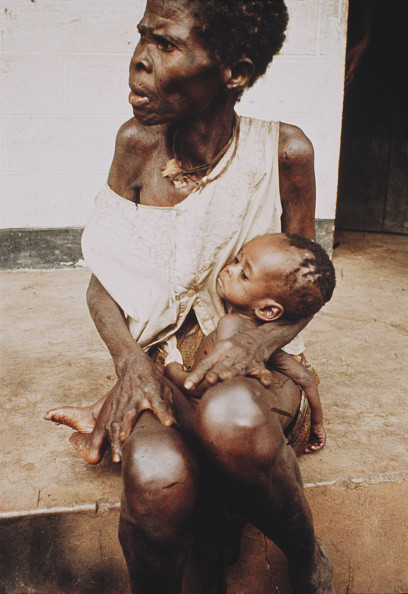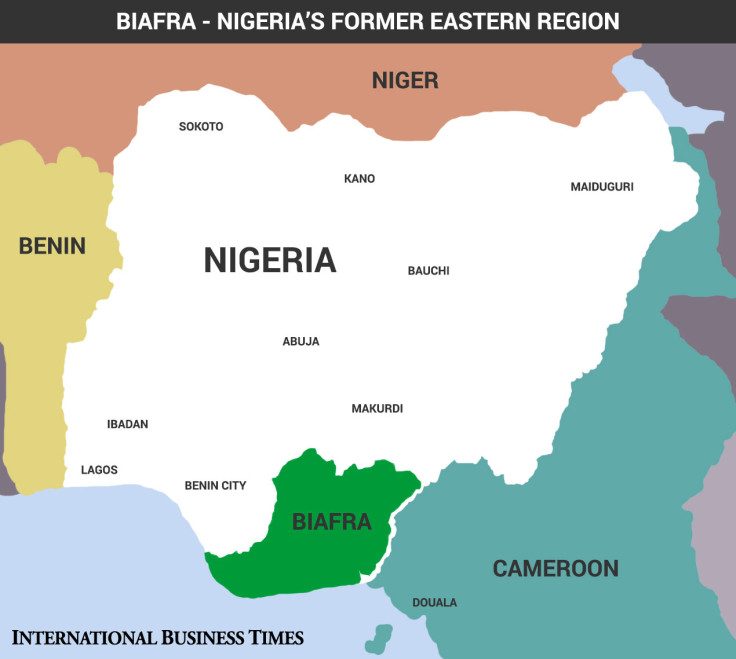Nigeria: Millions to commemorate Biafran war anniversary
Millions of people in southerastern Nigeria and abroad are set to pay homage to those who perished during the 1967-1970 Biafran war, also known as the Nigerian civil war. The commemoration, which takes place on 30 May, aims to remember what many people refer to as the "genocide" or "holocaust of the Biafran people".
The Biafran territories were forcibly annexed to modern-day Nigeria during British colonisation, which ended in 1960. Following two coup d'etats and the 1966 massacres of Igbo people in northern Nigeria, the contested Biafran territories, under the leadership of military officer and politician Chukwuemeka Odumegwu Ojukwu, seceded from Nigeria and declared independence on 30 May 1967.
The establishment of the Republic of Biafra sparked the war. The Nigerian government imposed strict blockades on food and medicines in Biafra and attacked hospitals and facilities run by humanitarian organisations, causing the deaths of between 1-3 million people.
The extent of starvation in the Biafran territories during the war sparked international condemnation and drew strong criticism against the Nigerian government.
During the war, a group of volunteers led by French doctor Bernard Kouchner entered the Biafran territories to assist people living there. When he returned to France, Kouchner openly criticised the Nigerian government and the humanitarian organisation Red Cross for what was perceived as a complicit behaviour that led to the starvation of many.
Moved by the extent of suffering witnessed in Biafra, Kouchner and other doctors created the Comité de Lutte contre le Génocide au Biafra, which became Médecins Sans Frontières (Doctors Without Borders) in 1971. The Biafran Republic was re-annexed to Nigeria in 1970, but breakaway calls have continued since.
Pro-Biafran movement today
The pro-Biafran movement has gained renewed momentum following the arrest of Nnamdi Kanu, one of the leaders of the movement, in October 2015. Kanu, leader of the Indigenous People of Biafra (ipob) and director of Uk-based Radio Biafra, is standing trial on six counts of treasonable felony charges.

Kanu's wife, Uchechi Okwu-Kanu, told IBTimes UK she was concerned following allegations her husband had been harassed in his cell. She also claimed her husband was a prisoner of conscience and urged the international community should intervene to free him.
During a December 2015 presidential media interview, President Muhammadu Buhari said Kanu would not be released amid fears he could jump bail and flee to the UK, as he holds both British and Nigerian passports.
The Nigerian government has always maintained that Nigeria's unity was a priority for the country and that although peaceful pro-Biafran protests were welcome, demanding the breakaway of the Biafran territories went against the constitution.
Nigeria's security forces have also been accused of violent acts against "unarmed" and "peaceful" pro-Biafran protesters, claims authorities strongly deny. In an exclusive report by IBTimes UK, Amnesty International confirmed that Nigerian security forces had used excessive force against pro-Biafran protesters on some occasions.

Biafra history
After the end of the British rule in 1960, Nigeria consisted of territories that were not part of the nation before the colonisation, resulting in escalating tensions among the communities.
People in the Eastern Region – a former federal division of Nigeria with capital Enugu – mainly from the Igbo community, wanted to secede due to ethnic, religious and economic differences with other communities in Nigeria.
The Eastern Region gained independence following two coup d'etats in 1966 and 1967. The fact that Nigeria's oil was located in the south of the country played a major role in the eruption of the war, during which medicine and food shortages in Biafra led to the death of millions.
Biafra has been commonly divided into four main "tribes": the Igbos, the Ibibio-Efiks, the Ijaws and the Ogojas. The modern-day states that make up Biafra from the eastern region and midwest are: Anambra, Enugu, Imo, Delta, Bayelsa, Abia, Cross River, Akwa-Ibom, Rivers, Ebonyi, southern part of Ondo State, Igbanke in Edo State, southern part of Benue State.
Amalgamation contract and birth of Nigeria
Pro-Biafrans cite the expiration of a so-called "amalgamation contract" as one of the reasons to justify their will to separate from the rest of Nigeria.
The contract was issued by Britain during the colonisation era and aimed at integrating people from the north and the south within 100 years since it was issued despite cultural, religious and economic differences among the various ethnic groups.
The contract, now at the National Archive of London, was created in 1914 by Frederick John Dealtry Lugard, the governor general of modern-day Nigeria. The document, opposed by the political class and the media in Lagos, expired in 2014.
The term "Nigeria" was created by Lugard's wife, British journalist Flora Shaw, in 1897 when she suggested to replace the "British protectorate of the Niger River" with a shorter term.
Nigeria up close: Check out our Flipboard magazine
© Copyright IBTimes 2025. All rights reserved.






















